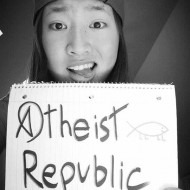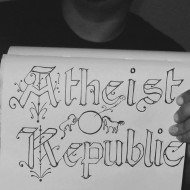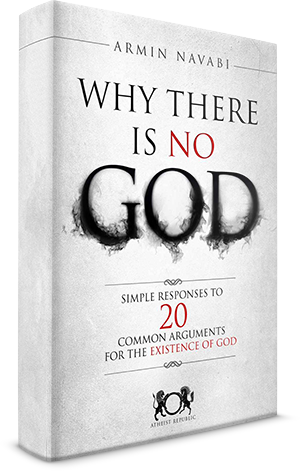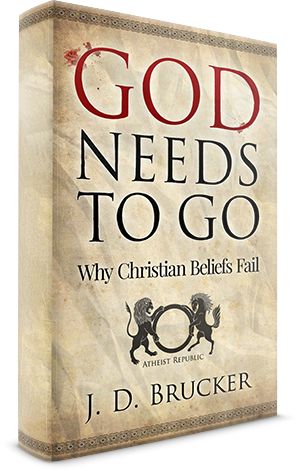This challenge isn't meant for atheist who have no interest in discussing the Bible, it is intended for those atheists who claim the Bible is historically or scientifically incorrect, or includes contradictions or has some otherwise harmful or negative effect upon you, the average atheist.
Tell me why you think the Bible is "wrong," or "stupid," or "pointless," or "harmful," etc.
Subscription Note:
Choosing to subscribe to this topic will automatically register you for email notifications for comments and updates on this thread.
Email notifications will be sent out daily by default unless specified otherwise on your account which you can edit by going to your userpage here and clicking on the subscriptions tab.





























I am not an atheist but I think this thread is very interesting. I have read that some atheist if not all think that the bible was just a book made out of imaginations. :)
Okay, I never really thought it very likely that it was a work of imagination. The reason is that it consists of 66 books written over a period of about 1,610 years by over 40 different people ranging from kings to shepherds and including priests, musicians, fishermen, a tent maker, lawyers, and a doctor.
For such a variety of people to have written a single body of work that is harmonious throughout from beginning to end, without contradiction, from imagination, is extremely unlikely. To have gotten the historical references right on and to have reported it accurately without exaggerating their victories and down playing their defeat, without concealing their imperfections while being thousands of years ahead when touching on science? I don't think so.
I never really thought about it that way and you have opened my eyes to a new concept about the bible. That does make a lot of sense when you think about it and the historical references add to the story line's credibility.
It is certainly important to analyze and contextualize the historical, political, cultural, and religious realities that were present when the scriptures of the Bible were written... As a religious scholar I find the literature of the Bible incredibly fascinating... But I am disappointed by both Theists and Atheists alike who make outrageous generalized claims about the Book... for example: every word should be taken as literal truth (fundamentalism), and that these truths are also scientific truths (creationism), which are both sadly killing and defacing the beauty and mystery of their own wisdom tradition, in my opinion. Then there are Atheists who don't bother studying the Bible at all, because they simply consider it to be a bunch of religious crap that doesn't contribute to scientific progress (Scientism)...
I'm not saying that every Theist and Atheist are like this, but that these type of people exist and that they both bother me.. Of course, to be religious you only need Faith, and not a PhD in Philosophy, but critical thinking, doubt, and skepticism has actually strengthened my own Faith, although it hasn't been an easy road either... Again with Science, you don't need Faith or the Bible to invent new medicines or learn how natural laws work, so I understand why some people don't bother with religious texts at all.. Ultimately, Religion & Science both have different purposes, and its a shame so many people think they are enemies when they SHOULD be complimentary allies..
"Education is the most powerful weapon which you can use to change the world" ~ Nelson Mandela
Just my 2 cents =)
As always you have some intensely thoughtful comments. Creationism is an unfortunate product of Biblical ignorance, it is unfortunate that they can't see beyond tradition to a more accurate interpretation. Just in, for example, Genesis Chapter 1.
Genesis 1:1 There are two different states in the Hebrew verb, a perfect state which indicates a complete action and an imperfect state which indicates an incomplete action, or continuous action.
At Genesis 1:1 the word bara, translated as created, is in the perfect state, which means that at this point the creation of the heavens and the Earth were completed. Later, a Genesis 1:16 the Hebrew word asah, translated as made, is used, which is in the imperfect state, indicating continuous action. The heavens and Earth were created in verse 1 and an indeterminate time later they were being prepared for habitation, much the same as a bed is manufactured (complete) and made (continuous) afterwards.
Genesis 1:2 The planet was a water planet, waste and empty, meaning that there was no productive land. Though the sun and moon as part of the heavens were complete, at this point light had not penetrated to the surface of the Earth. Job 38:4, 9 refers to a "swaddling band" around the Earth in the early stages of creation. Likely there was a cosmic dust cloud of vapor and debris which prevented the light from the sun from being visible on the surface of the earth.
The Hebrew word ruach, translated as spirit, indicates any invisible active force. Wind, breath, or mental inclination, for example. The Holy Spirit is Jehovah God's active force. Invisible to man but producing results. Throughout scripture it is often referred to as God's hands or fingers in a metaphorical sense. (Psalm 8:3; 19:1)
Genesis 1:3 Here the Hebrew verb waiyomer (proceeded to say) is in the imperfect state indicating progressive action. This first chapter of Genesis has more than 40 cases of the imperfect state. The creative "days" were a gradual process of making Earth habitable.
The light was a diffused light which gradually grew in intensity. Some translations more clearly indicate the progressive action:
A Distinctive Translation of Genesis by J.W. Watts (1963): "Afterward God proceeded to say, 'Let there be light'; and gradually light came into existence."
Benjamin Wills Newton's translation (1888): "And God proceeded to say [future], Let Light become to be, and Light proceeded to become to be [future]."
The Hebrew word for light, ohr, is used. This distinguishes the light from the source of the light. Later, on the fourth "day" the Hebrew word maohr is used, signifying that the source of the light only becomes visible then through the swaddling band.
Genesis 1:4 Light and darkness is divided between the eastern and western hemispheres as the Earth rotates on its axis.
Genesis 1:5 Here the Hebrew word yohm translated day, indicates the daylight hours, but the term will be applied in the following verses to indicate various lengths of time. The word is used to describe any period of time from a few hours to thousands of years. (Zechariah 14:8 / Proverbs 25:13 / Psalm 90:4 / Isaiah 49:8 / Matthew 10:15)
The terms evening and morning are metaphoric. At this point there are no witnesses on Earth to a literal night and day, but there are witnesses in heaven. (Job 38:4, 7) The evening symbolizes the period of time in which the events unfolding were indiscernible to the angels in heaven. The morning symbolizes the period in which the angels could distinguish what had been accomplished. (Proverbs 4:18)
Genesis 1:6 The word expanse is translated from the Hebrew raqia, which means "spreading out." Since the root word from which raqia comes is raqa, which is sometimes used in a sense of "beating out" some confusion has been caused by the Greek Septuagint translation of raqia as stereoma, which means "firm and solid structure" concluding when the Latin Vulgate used the term firmamentum because, at that time it was thought that there was a metallic dome surrounding the earth with sluice holes from which rain fell.
The International Standard Bible Encyclopaedia states: “But this assumption is in reality based more upon the ideas prevalent in Europe during the Dark Ages than upon any actual statements in the O T.” - Edited by J. Orr, 1960, Vol. I, p. 314. For example, at Job 36:27-28 the water cycle is described without any reference to the Dark Ages understanding of sluice holes.
Genesis 1:7 In verse 6 and 7 part of the water that covers the Earth is lifted to the heavens to form a water canopy surrounding the planet. This canopy was used to flood the earth during the days of Noah. (2 Peter 3:5-6)
Genesis 1:11 The Biblical kind, from the Hebrew leminoh, Greek genos, and Latin genus, differs from the Evolutionist kind. The Biblical "kind" can be defined as divisions in which cross fertility can occur, a boundary between these kinds is drawn where fertilization ceases. Apple trees, for example, don’t produce broccoli, squirrels don’t produce horses.
In biology a kind applies to animals and plants which possess one or more distinctive characteristics, meaning the biological term kind may contain several varieties within a Biblical kind.
Genesis 1:14 The light in verse 14 is different from that in verse 3. In verse 3 the Hebrew word ohr is used, meaning the light from the source. Light in a general sense, whereas the light in verse 14 the Hebrew word maohr is used, signifying the source of the light is now visible. See Genesis 1:3
The sun, moon and stars are set as a sign of the seasons, days and years. A most accurate timepiece. The use of the term “sign” is often mistaken as a reference to astrology, which is incorrect.
Genesis 1:16 The Hebrew waiyaas (proceeded to make), from asah, in verse 16 is different than bara (create) in verses 1, 21 and 27. Asah is the imperfect state indicating progressive action. The luminaries as part of the heavens had already been completed in verse 1, but now they were visible on Earth and prepared for their intended use. Asah can mean make, or appoint (Deuteronomy 15:1), establish (2 Samuel 7:11), form (Jeremiah 18:4), or prepare (Genesis 21:8). Also see Genesis1:1
Genesis 1:20 The word soul, from the Hebrew nephesh, means "breather." The soul is in the blood, the life itself, of any breathing creature. At Genesis 9:3-4, for example, the Hebrew word nephesh can be translated as life or soul.
Genesis 1:21 Sea monsters, from the Hebrew tanninim, great reptiles. The Hebrew term remes means to creep or move about; an aimless movement. It covers a variety of creatures and distinguishes these animals from domestic or wild birds, beasts and fish.
Genesis 1:24 Cattle; domestic or tame animal (Hebrew behemah).
Geneis 1:25 There are two creation accounts. The first is a chronological account (Genesis 1:1-2:4) and the second is given according to topical relevance. (Genesis 2:5-4:26) They differ in order and are often wrongly thought to contradict one another.
Genesis 1:26 God refers to his son, Christ Jesus in his heavenly pre-human existence. (Genesis 11:7 / Proverbs 8:30 / John 1:3 / Colossians 1:16) Being made in the likeness, image or semblance of God reflects mankind's potential for being like God, possessing his qualities of wisdom, power, righteousness and love.
Genesis 1:27 Too often it is overlooked by selfish, dominating men that woman too were created in God’s image, and thus deserving respect.
Genesis 1:31 God’s creation is good. There is no sickness, disease or slow progression to death. The small area they reside in is a paradise reflective of the potential, and in fact the purpose of growing throughout the entire planet. It isn’t God’s purpose for us to live in sin on Earth and then move on to heaven.
The creative days, each of which may have lasted thousands or even millions of years, and had taken place an indeterminate period of time after the creation was complete in verse one, are not indicative of any speculation regarding the age of the Earth and universe. The Bible simply doesn’t say.
Period 1 - Light; a division between night and day (Genesis 1:3-5)
Period 2 - The Expanse; a division between waters above and beneath. (Genesis 1:6-8)
Period 3 - Dry land and vegetation. (Genesis 1:9-13)
Period 4 - Heavenly luminaries become visible from Earth. (Genesis 1:14-19)
Period 5 - Aquatic and flying creatures. (Genesis 1:20-23)
Period 6 - Land animals and man. (Genesis 1:24-31)
Taken from Pathway Machine's http://www.pathwaymachine.com/bible/genesis/gen1.htm
You sir, have certainly done your homework. I think it is absolutely vital that one takes the Hebrew language itself into consideration when reading these scriptures and interpreting them. I had a Jewish professor with a PhD joke with me that he could spend an entire class just discussing and deciphering the first Hebrew word found in Genesis. If only understanding the Bible was as easy as reading the plain English translations.. it goes much, much deeper then that, as you have just demonstrated. Cheers.
Part of doing my homework consists of paying attention to interpretations that differ from my own. For example, your professor with a PhD would argue my position on perfect and imperfect states in the Hebrew due to an odd theory known as the Waw-Consecutive, formerly known as the Waw Conversive, and now known as the Waw Conservative. It dictates that the ‘and – Waw ו’ appearing before the first of a series of consecutive Hebrew Verbs in the Imperfect Tense, if preceded by a Hebrew Verb in the Perfect Tense, indicates that all of them should be read or taken as Perfects rather than what they really are: Imperfects and vice versa, provided of course certain vowels associated with the Waw ו in the Imperfect are present.
O.L. Barnes, from Oxford and Benjamin Wills Newton with their works "A New Approach to the Problem of the Hebrew Tenses and Its Solution Without Recourse to Waw-Consecutive" and "The Altered Translation of Genesis 2:5" are good answers to the Wav or Vav Conversive.
My favorite historical time period is near the end of the Golden Age of Islam (c.750-1258 CE).
The city of Cordoba in Spain became a peaceful city of tolerance for Muslims, Christians, and Jews . Commonly referred to as ‘Al Andalus’ by Muslims, Cordoba became one of the most advanced cities in 10th century Europe, serving as a great cultural, political, financial and economic centre for the Islamic empire. Cordoba rivalled the Islamic capital of Baghdad in magnificence with half a million residents, twelve royal palaces, a thousand mosques, eight hundred public baths, seventy libraries, colleges, country houses, water-supply systems, exotic gardens and paved and lit streets . One of these libraries was the largest in the world containing more than four hundred thousand volumes . The Great library of Cordoba was also said to have employed five hundred librarians, scribes, physicians, historians, geographers and copyists .
Two prominent philosophers that emerged during this time of ecumenism were Maimonides (1135-1304) and Averroes (1126-1198). Maimonides was a Jewish rabbi, and physician who integrated philosophy into his practice of medicine. He also supported the notion that Judaism could be used as a tool of reconciliation amid Christianity and Islam . Averroes was a Muslim, but also sought to balance both religious and scientific ideas. He was an expert in mathematics, physics, astronomy, and medicine but is also most well-known for his commentaries on Aristotelian philosophy . Prior to the life of Averroes, the works of Aristotle had long been lost to the rest of Europe. Thus, it should be known that Westerners owe a great debt to the scholars of Cordoba who preserved and studied all religious and scientific texts, from many various cultures, which the extensive Islamic Empire was able to provide them with.
Science and Religion haven't always been enemies..
Ah, Rambam. "From Moses to Moses there was no one like Moses." Moses Ben Maimon.
I have heard of Cordoba's religious tolerance, but Maimonides family fled there in 1148 when the Almohads conquered it.
"Can there be a greater stumbling block than [Christianity]? All the prophets spoke of the Messiah as the redeemer of Israel and its savior . . . [Christianity] caused the Jews to be slain by the sword, their remnants to be scattered and humbled, the Torah to be altered, and the majority of the world to err and serve a god other than the Lord." Mishneh Torah, “The Laws of Kings and Their Wars,” chapter 11.
For some reason my edit function doesn't seem to be working, so a correction to my last post. I meant to say that Miamonides family fled FROM there (Cordoba) in 1148.
I would like to say that i've read the hole book and i can give a truly well founded answer and my fully oppinion, but i've only read the first parts of the old testament and various bits and pieces of the hole book (over 1200 pages of useless literature isn't something very easy or fun to read). My oppinion will remain the same after finishing it and the only difference will be that i can give you more examples of it's strange teachings.
First of all, depends on how you read it. "The Bible is the most powerful tool of an atheist." as they say and it really is. Read by a beliver, things are different. Most religious people never read it and if they ever did, they didn't understand it, just accepted the information without thinking about the real possibility of that thing really happening or if it could happen and if this story is good or wrong. If there is wrong, you might say that God knows better and you, as a simple creation of him, can't understand. At that point you admit that yourself are a primitive animal that can't think for himself. Congrats, you are a true Theist. If the thing still seems fishy and wrong, you are making the first steps for atheism.
Who wrote the bible? The old testament (anyway, the books that compose it) reffers to a period of time in which most of the people were illiterate and couldn't not possibly write something like this. Of course, it existed some brither people that had the education to write them, but religion doesn't work like that. An educated and intelligent person never had been the messager of God, in history. Today, yes, some intelligent people are religious, but is a difference -> they are raised under religious indoctrination. Everything in there is, as the church wants us to belive, from stories passed from generation to generation. That makes no sense. Why? Althoug some stories might pass and you could end up with "There was a great flood, that guy builded a boat, he took some animals, the flood ended, he repopulated the planet." but how can a simple story can pass the test of time with details of the exact age of Moises or other characters that are all over the book. The exact age of when they did that and that, when their child is born etc. The details might be remembered if some numbers whore important to the story but they appear just as extra information that has no relevance to the story what so ever. The stories in the old testament might survived but no one will ever bother to remember those numbers. Stories like this survive through the people, the rural people that at the time and even now weren't that intelligent to remember those numbers and had virtually no reason to do so. Therefore, you can only conclude that the books that compose the old testament were writen by someone who had the ability to write, had the education and that kind of statute was later avaible than any of the old testament happenings. Who that person might be? A random guy that seems interested in history and wanted to write them down because it was fun for him or a higher person, a person that wanted to control the people, that needed some complex background for its story and put down as much as possible to make it seem legit? Such mental pleasures of the human mind are virtually avaible since the 1500's or 1600's and the Bible is much older than that. The second option seems a bit more plausable. I agree, it needs more details, but i'm not the one to detail such a person. It could be anything.
Furthermore, you really can't understand the logic of it, in so many grounds. About the thing i wrote above, why they mention in the Bible about the giants, but just so little? Giants. Pretty big subject (ignore the joke). Seems important to our history, the skeletons found prooved their existence...the Bible had the opportunity to talk about them. No. The Bible attitude is simply like:" At the age on 768, Jimmy saw a goat. Also, there were giants on Earth. At the age of 866, Jimmy tryed a new robe that he liked it. At the age of 1478, Jimmy had its first child with his wife. At the age of 1579, Jimmy looked strange at a tree." The hole thing isn't logical if we consider that the old testament wants to tell us some old happenings. Also, the book gives us exact quotes from "God" (which...uhm, is pretty impossible, acording to every way that you could look at the thing), some useless stories about some random peasants which without them, the hole book would remain the same. Then, Genesis, the creation of man is so retartedly writen and lacking proof and even fictional details that you can't simply belive it. The hole Bible is full of useless stories that simply don't improove the book or have any relevance to the main story. I see it just as a desperate try to make the thing seem more legit.
Using logic and the basic things that the church teaches you, makes you think that religion represents purity, kindness, positive things and so on and the Bible is an absolute tool about that. I though about that as a child but i didn't see it happening. Why the priest was a normal person, why he treated his job with such boredom, why he didn't singed those damn songs with passion, why he checked his messages while i was confessing to him, why he asked so little, didn't let me finish and simply was anxious to end that? Why you want to teach me about being good when your own precious book tells me about incest and crimes? Why is ok to kill in the name of God when isn't ok to kill? Why incest is wrong when people in the Bible and some "chosed" characters were doing it like a normal activity? Why are we all the same, equals, but God always had his favourites? Why is wrong to sin, but then is ok to confess, your sins will be forgotten, but in the end, you will be judged for your hole life?
What was Jesus? I see it just as a marketing movement. Why? God sends his son to make us belive again, makes some miracles from time to time, dies for our sins (thing that still makes no sense). The hole thing was just like a Free Trial version of God. How can you have it more? Belive in him! Miracles will happen if you belive in him, but nothing happens, why? Oh yeah, all of us need to belive in him. Pretty hard conditions.
The hole contradictions of the bible subject is well known, i don't need to go into it. To offer more proof that the Bible is fake, crap and writen by people with interests...why black or asian people don't exist in the Bible? Why Africa and Asia don't belive traditionaly in Jesus? Is the Bible saying that the whites are the supperior race? Like, you know, it was belived in the past by the powers of...that place, Europe? (the place were the possible writers of the bible might've been?). Where is the Vatican, the center of Christianity? You might play the card of why do God chosed the jew people as its first army of belivers. Because they had nothing to belive in and they were an easy target? Well, a good part of europe, african tribes, some american tribes, some australian tribes...were pretty much good for the job. Oh yeah, some parts of Europe were pretty poor and the rest weren't white or close to Europe. God made the good choice, he promoted himself in the markets that had popularity and enough potential customers to subscribe to him! Also, they had a pretty good economical situation, they could build a nice, big and full of gold church to pray at him. God must be a pretty great entrepreneur!
Why christianity is based on so many foreign traditions and religions? Religions that according to them, are fake, totally wrong and full of...bullshit? Why old religions like the Dacian's one was so similar with Christianity long before some even heard of Jesus and his gang? Why Christianity has a little god for everything, calling them saints? We still have gods, many gods, is not a monotheistic religion. We have a god for everything like our ancestors, but this religion is better, is the true one.
I would like to conclude, i would like to say that the Bible is badly writen, in desperation to seem legit, uses no logic, misses on big historical events, is filled with useless information, with stuff that is wrong according to your normal human morals, but is a book of religion, of good things, God loves you as long you pray to him and give him stuff, despite he is, in theory, so supreme the he could have everything and he could simply create us to be belivers and perfect, not giving us opportunities to sin and then get mad. Is like pushing someone off a cliff and say that he is a suicidal maniac. That book is fake, idiotic, made to control the masses. Following her gives you nothing.
One could say in short the bible is written in tongues and its story is crumbling like the walls of Babylon. Built long ago on a foundation of sand in a language translated so many ways that there is now no agreeable interpretation and to many of the dwellers on this rock in another planet's sky it's pages are filled with nonsense.
I would be inclined to agree with such a statement but would also say there are important things to be gleaned from the bible and other theological works, many of these things can be used to teach us about life on the blue marble. Just view the bible as a book of metaphor not to be taken literally. Try to learn the style of the author writing each section. Perceived with an open mind the books can be interesting. perceived with a biased mind the books can be perceived sacred or dull and boring. Written by man one can use it to obtain nuggets of usable knowledge from within it's pages. It is true, beauty is in the eyes of the beholder and knowledge is only worth what you do with it.
Boogie,
At the risk of sounding like a primitive animal that can't think for myself, my response: I agree that most Christians have never read their Bible, or if they did, they didn't explore it further in order to understand it. The same applies to most unbelieving critics of the Bible. Generally the tendency is to take its meaning to have been faithfully presented by the believers themselves. This is problematic because the believer's interpretation depends more upon tradition than the actual teachings. For this reason the Bible is not an effective tool for either believers or unbelievers, as such. The same can be said for an academic examination, again dependent upon tradition which is primarily based upon pagan mythology and Greek philosophy. Surprisingly, all of this is easy to recognize once it is realized and it's historical origins discovered. Easier than it sounds.
One thing is for sure. The Bible isn't a mysterious, metaphysical or secretive work. It is revelation. Revealing.
It is a mistake to think that the ancient people were illiterate, and this myth is a reflection of a period much later than the writing of the Bible known as the dark ages, when Rome fell and all of the world fell into darkness and despair.
I was raised an atheist. Most of the atheists I have communicated with online were raised theist. I don't believe in indoctrination, its a word used often in a xenophobic sense. It's much like your earlier claim that theists are primitive animals that can't think for themselves. This doesn't sit well when followed by scriptural interpretation. You see yourself as intellectually superior because you are not, just as the religious see themselves as morally superior when they are not.
When you give the confusing example of the flood and the exact age of Moses I'm not sure where your criticism is coming from. It seems to suggest that the details are unnecessary, but is that because you have no respect for what you are reading or that you just don't understand.
From, for example, Genesis 5:1-29; 7:6 we have a period of history from Adam's creation to the flood. 1,656 years. From Adam's creation to the birth of Seth is 130 years. From then to the birth of Enosh 105 years. From then to the birth of Kenan 90 years. From then to the birth of Mahalalel 70 years. From then to the birth of Jared 65 years. From then to the birth of Enoch 162 years. From then to the birth of Methuselah 65 years. From then to the birth of Lamech 187 years. From then to the birth of Noah 182 years. From then to the flood 600 years.
This seem boring? I can see how that is true for some people, but think about it. A collection of 66 books written over a period of 1,610 years by over 40 different people and yet you can take the date of any event given within it and come up with and compare that date with any other to test it's accuracy. No wonder why Sir Issac Newton said no secular historical text could even compare!
And as for me, a humble scholar of the Bible thousands of years later, who can compare the dates of secular events mentioned in the Bible as well as even more accurate astronomical events such as eclipses . . . is a remarkable thing which the unbeliever seems completely oblivious to. Some achievement for an ignorant and primitive bunch of illiterate goat herders . . . seems to go right over the heads of the smug intellectual skeptics.
Yet the same skeptic, under the assumption that the ancients were more ignorant than those in the dark ages, and in so doing labors under a false pretense, establishes the date of those writings later. And your claim, a common one, that the Bible was created in order to control people is lame, at best. A book consisting of examples of how people can't be controlled designed to do just that and to what effect? You are at issue with religion, who's organized sects have been successful not in controlling people, but being controlled by people.
Black people and Asian people do exist in the Bible. Lot was Asian, Solomon's lover was black, the man assisting Jesus at his death march was black, there are other examples.
Sit down and read the Bible.
Okay, I think there is something that every Atheist and Theist need to understand, regardless of their beliefs, when it comes to understanding the Bible,
Within the Rabbinic tradition, there are 3 main methods of interpreting Biblical scriptures. Firstly, there is Peshat which means the plain interpretation. Secondly, there is Remes which is allegorical. Thirdly, there is Drash which is metaphorical.
And then there is Kabbalah, which adds a fourth method, and is personally my favorite approach.
Kabbalah is unique because it appreciates all these layers of interpretation but adds a new layer called Sod. Sod literally means ‘Secret’ and is recognized in Judaism as the mystical way of interpreting scripture . This layer allows mystics to access the scriptures and enjoy new meanings that are not always explicit. In other words, Sod is like a key that mystics use to open texts and discover inner meanings. Kabbalists also consider the different interpretive methods to be like the 4 layers of the Orchard (Garden of Eden), or Pardes (Paradise). The term Pardes itself is often spelt PaRDeS in Kabbalah and serves as an acronym and code word for all the different interpretive layers: Peshat, Remes, Drash and Sod.
In Kabbalah, the Hebrew language is also considered to be Divine, so by simply meditating on the Hebrew letters of the scriptures, they believe that one may be able to invoke a personal experience of God (i.e. the Divine)
So think of it this way, the plain, literal interpretations of reading Biblical scriptures is only the tip of the Iceberg! There is much more to be discovered beneath the surface..
The Bible itself isn't harmful. It's just a collection of folklore. For believers who wish to live their own lives according to the teachings, it can be beneficial, unless they become politically active and try to force the rest of us to live according to their religious rules too.
We should be using the Bible not as some kind of moral authority but rather as an uncomfortable window to our barbaric past, a quaint reminder of the inherent danger whenever anybody claims to have a monopoly on the truth. This kind of thinking almost inevitably leads to abuse and bloodshed. That should be our lesson from the Bible.
Again, the problem isn't the book but rather the excessive authority people read into it. For example, Catholics are spreading misinformation that condoms cause AIDS in Africa to discourage locals from using them. Fundamentalists there, with gleeful support from fundamentalists in the US, are pushing for legislation to execute gay people. Witches are still burned there. These are real humans suffering real harm due to the way certain passages in the Bible are interpreted AND the fact that the Bible is viewed as some kind of ultimate authority by people who wish to push its agenda.
We should know better. The notion that any reasonably bright omnipotent being would use second-hand revelation to relay messages is absurd anyway. There is only downside risk and no advantage whatsoever. The method essentially amounts to implicitly beginning every sentence with, "Some guy said god told him to tell you..." What could possibly go wrong?!?
To be fair, I should point out that a lot of good has been done under authority of the Bible as well. As we see again, it's not the book, it's the people. It's time to stop focusing so much on the details of the book and look at ourselves. We must learn the lessons from our distant past and rely more on rational bases for our actions rather than an empty appeal to authority.
Wow, I think you are really passing a superficial judgement on those of us who have read the bible (several times and in many languages in my own case) but do not believe in god as it's depicted.
It's a piece of folklore and in some cases a very insightful historical reference. So are many other pieces of literature of the time. It's written with a bias that I personally do not agree with, but that no way makes it stupid, and it's far from pointless... it's just a question of what the point is.
If you have any targeted questions about particular points of contention *within* the text, I'm sure you'll find some of us here to be well versed enough to discuss them at length. As it stands, you may want to read back into the forums a bit and see what we've discussed already.
about the superficial judgement, is this in response to my comment..? If so, my apologies. Maybe I came off sounding judgemental.. but I meant to just contribute my understanding of the Bible to the discussion in case others hadn't been aware of the levels of meaning. cause knowledge is power! =)
Actually, I was referring to the OP... but your apology is appreciated, even though it's unnecessary in this case :) Thanks for your contribution!
There are portions of the bible that have been incorrectly translated, there is no proof that it is even the word of god (even a theist has to admit that the people who physically wrote it were human, not divine) it contains no information in it that would not be known by the authors of the time period, and several portions have been added and erased for the benefit of those in power at the time.
Good points, but I'll also add that the authorship of many books of the Bible *has* been recorded, as well as the deletions and additions you mentioned, Sarah.
It's quite possible to Google up the facts on the authorship of most books of bible, if anyone's interested. Though I did find the most entertaining summary of the bible's authors to be Who Wrote The Bible by Richard Friedman. It really adds a lof of perspective and makes the whole thing much more interesting, particularly the old testament.
A good read at this point in the discussion is the history of the First Council of Nicaea. Some interesting stuff that is germane to the conversation.